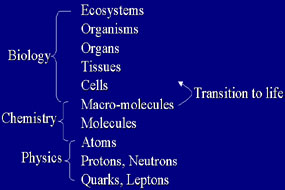Reductionism and Non-ReductionismAt this point, I want to hone in on this question of reductionism versus non-reductionism. Here's one way of sort of intuitively making the distinction. The reductionist says--hah--the settling of the vitalist controversy shows that all that really exists is the stuff that physics studies. The non-reductionist replies, well, in a sense that's true; that is, if you took away all the stuff the physicists study then all living organisms would be gone also and there would be nothing left. But it's not true to say that there are only quarks and leptons. In addition, there are things like sulfur atoms and salt molecules and DNA and bacteria and trees and frogs. All of these things are just as real as the quarks and leptons and protons and neutrons. Hierarchy of Complex Systems
Now is this just a verbal dispute talking about what's really real as opposed to what just is sort of real, appears to be real? Well, let me give you an even simpler analogy. Imagine a couple of kids playing with Legos. Now, I assume that everybody knows what Legos are. I teach at a very culturally mixed environment and so I have to explain in my classes that these are the little plastic blocks that snap together and kids build things out of them. Now suppose you've got two kids playing and one of them says, look at all the stuff on the table; we've got houses and we built cars and we've got airplanes. But the other kid says no, there aren't really any houses and airplanes and cars; it's all just Legos. Well, whose side would you be on? And is there a real answer to that question? Are there really only Legos there or are there also cars and airplanes and what have you? What would make you change your mind about that issue? My suggestion is it's not just a verbal dispute and it has to do with causation. That is, we connect our concept of reality with having causal powers. So the dispute between the two kids--I think we might tend to agree with the reductionist so long as the things were just sitting there. But suppose the little airplanes started to fly; suppose the little cars started driving around on the table. I think the reductionist would then be inclined to say oh, my gosh, there really are cars and airplanes there. So my point is that the dispute between the reductionist and the non-reductionist can be recast as a dispute over causation. The reductionist says, in effect, all causation is bottom up; that is, the laws of physics down here determine everything that happens and the causation percolates upward, determining what happens all the way up to the top. The non-reductionist, on the other hand, says no, there are new causal factors and laws at these higher levels of organization that also have to be taken into account in order to understand what goes on in our universe. So my question is: How can this be? Remember that for the non-reductive physicalist we're not going to introduce any new non-physical forces or entities, vital forces or psychic energy. So how can the causal properties of these higher-level things really matter? And how can it not be the case that they interfere with or cancel out what happens according to the laws of physics? This, I think, is the center of the question of reductionism. And the way I want to approach it is by introducing the notion of downward or top-down causation.
|

